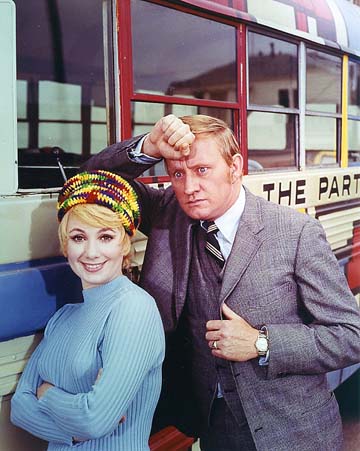
Come on, get happy!
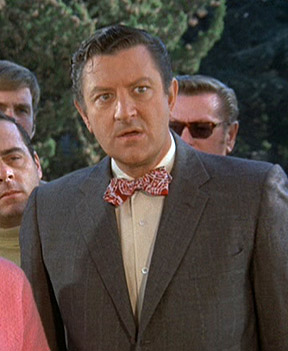
The alternate Reuben
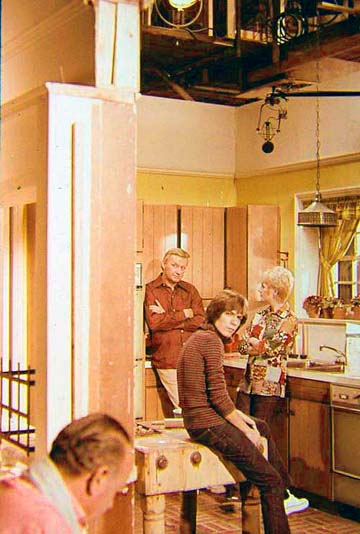
Filming on Stage 30
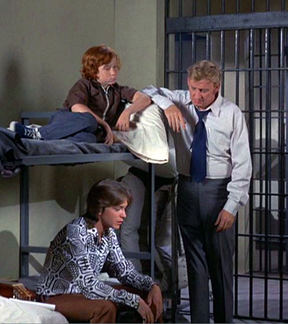
"Go Directly To Jail"
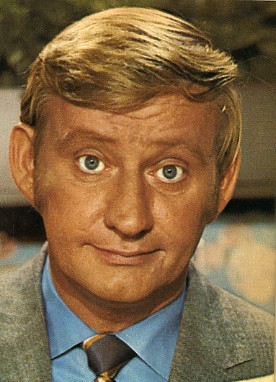
Funny man Dave
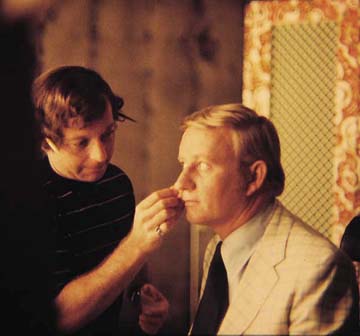
With make-up artist Mel Berns
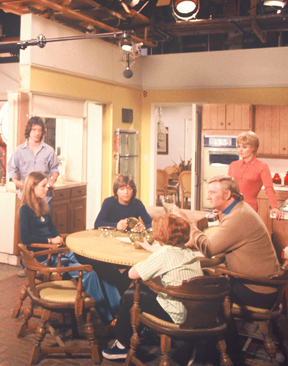
Rehearsing
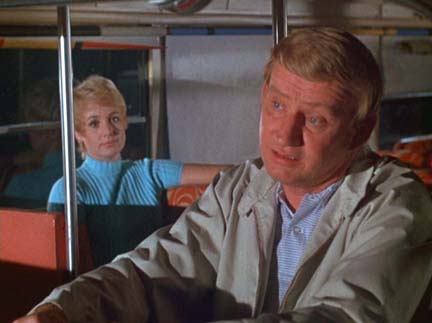
Driving the bus
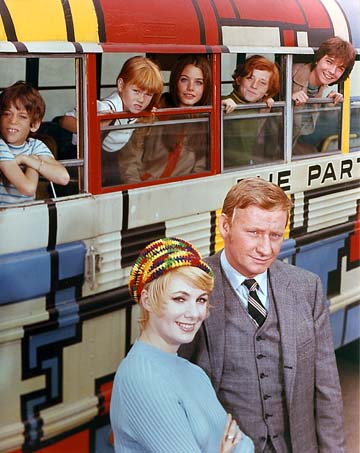
Season 1 publicity photo
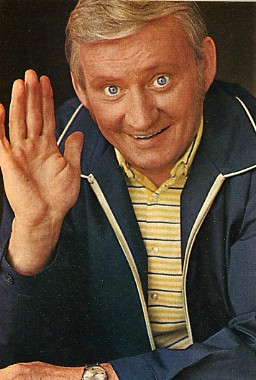
Reuben
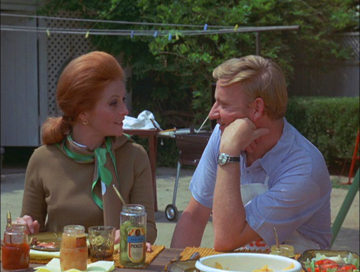
"They Shoot Managers...
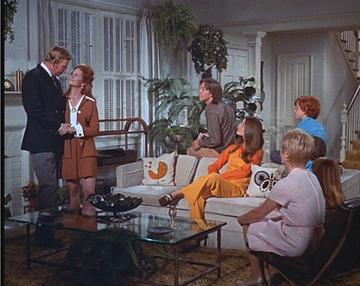
... Don't They?"

Continued:
GH: You left "Laugh-In" after the first season in 1969. Did you return to stand-up? DM: Well I wasn't out of work that long because I auditioned for "The Partridge Family" soon after that and ended up doing the pilot in December of 1969. GH: What was the audition process like when you were reading for the role of Reuben Kincaid?
DM: The first time I auditioned, there were about 65 guys auditioning for the part. The second time I auditioned there were 25 guys reading for the part. The third time I auditioned there were three of us.
GH: Who was present when you auditioned?
DM: Bob Claver was there, Jerry Paris - who directed the pilot was there. Renee Valenti, Screen Gem's casting lady was there. GH: Did you audition with any of the other cast members? DM: No, I didn't even meet Shirley till the first day that we got together to sit around and read the script. But I think I knew she was going to do it. GH: Did you travel to Vegas for the pilot?
DM: No, I didn't need to go to Vegas because all they really shot were exteriors of the bus pulling up to the Caesar's Palace, with "The Partridge Family" on the marquee. They put that there just for the shot and took it down right after. GH: Overall, what was "The Partridge Family" experience like for you? DM: Well, "The Partridge Family" - sometimes it was fun, sometimes it was terrible, boring. There were shows where we'd have a 3 - 4 page scene in the dining room of the Partridge family's house and the whole family might be sitting there. That would mean they'd have to do coverage on all 6 or 7 people, which means they had to change the lighting each time they did the coverage, plus the master shot and you would end up spending from 7 - 8 o'clock in the morning till 3 in the afternoon sitting there in the dining room. Well, that was just boring. Terribly boring. Then, there were other shows that were more interesting. GH: Which ones? DM: The show we did at the prison, where we got quarantined and had to spend the night there. That was utilizing the concept of the traveling Partridge Family as far as I'm concerned.
GH: That's an interesting point. The first season of the show was structured very differently from the other three in that you and the family were on the road every single week. It was very different after Season One. DM: Oh sure. Do you know why?
GH: Please tell us! DM: Because suddenly the network figured out they had a potential hit series on their hands and they were afraid that the public - the family oriented pubic - would frown upon the idea of these kids on a bus, traveling around when they should be in school instead of on tour all of the time. So, they started writing a lot of scripts with them sitting around the dining room, or the garage rehearsing. But not much on the road anymore. It was kind of peculiar in a way that they would do this story about school and rehearsals in the garage and Shirley's love life and then all of a sudden they're performing somewhere. Then you see them getting off the bus and it's back to school, back to Shirley's love life. They'd have wonderful plotlines like, Keith's flunking sex education, or Danny gets acne - things that I would think bore the heck out of most people. I don't know how they managed to hang on to their audience with what they were doing. GH: So that was an ABC Network decision to alter the show? DM: Oh yes. Who else would want to do that expect the network? So that's the reason it turned out to be a totally different show. Let me tell you what else happened. At the end of the first year, they started checking the contracts and they found out that David Cassidy's contract had not been signed properly. So they did not have a signed contract with him and they had to renegotiate. And David had a pretty tough agent. So he wound up getting a lot more money. So they decided that if he's going to get more money, they have to give him more to do other than just sing and say a few lines. So here's what happened: They made up scripts and storylines and things in advance. And they would give them to us to look at during the hiatus. These were shows we were going to do when we came back to work. That particular summer, they gave us 4 - 5 scripts and when we returned after hiatus they gave us the revised scripts. In almost every case, scenes that were written and already created for Danny and me had been changed to Danny and David. So, they were taking things that I was supposed to do and giving them to Cassidy so he would have more to do. That was irritating. Now, I don't think that was David's idea - I think it was their idea on how they would handle giving him more to do. I felt that Danny and I had a pretty good comedic relationship. I didn't think that two bickering brothers was as funny as a bickering kid and an agent. I thought that was a funnier idea.
GH: So it must have been frustrating for you? DM: It was. Had I not seen the original scripts, then I wouldn't have known, at least. GH: In your opinion, how much of that had to do with what they were paying David, and how much had to do with the fact that his popularity went through the roof during this period? DM: Well I'm sure it had to do with what they were paying him. One of the things renegotiated when they re-did the contract was they were paying him a lot more money from the first year to the second year. But all of that was besides the money he was making on the weekends performing in concert. {Note: David Cassidy's salary was raised from $600.00 a week to $3,000.00 a week. In addition, his 6-year contract, standard at that time, was reduced to 4 years, among other stipulations.} GH: Did you have to learn how to drive the bus? DM: Well, I didn't have to learn, but I did drive it a couple of times. I'm glad it was only a couple of times. It was a bus after all, and it was so old that there was no power steering. You can imagine what it was like to drive a bus without any power steering. Even Shirley had a terrible time when she was driving, turning corners, and things like that. She had an awful time with it. I don't know, because they could have afforded to put power steering in the bus but they didn't. GH: In 1970, there were three different fires on the Columbia Ranch. The August fire destroyed the area used for "The Flying Nun," which was basically on the other side of the Partridge's back yard. Do you recall filming being interrupted because of damage to the Partridge's façade? DM: No, I don't remember the façade being damaged. I don't know where the fires were, but there were a lot of areas that we never went into. The Ranch was a great lot. I used to like to run around and show people because I could take them into a New York tenement or into the Western Town where "High Noon" was shot. It's a great lot with a lot of history. GH: In your new autobiography, you mentioned the frustration with certain episodes, where Reuben was only used in the opening tease, or the closing tag. Can you elaborate? DM: Oh sure, it was frustrating. I'd read the opening scene, and if Reuben was leaving for a trip, I'd ad-lib and say, "Well, I'll see you in the tag." And in some cases it was true because if the episode is going to be about Shirley's boyfriend or Keith at school, they didn't have any use for Reuben Kincaid. There was a time when they thought they might have Reuben move into a spare room in the Partridge house, but they finally decided against it. GH: Why did they do that? DM: Because it was 1971 and you didn't do things like that. You didn't have bachelors move into a house where a widow was living. It was not a seemly thing to do. GH: Was the ABC's Standards and Practices department very strict? DM: Well, I remember a scene where Danny was having trouble in school. And my line was something along the lines of, "Gee, that's really rotten, Danny." And they came in from the Network and said, "Change the word 'rotten' to ' awful.' 'Rotten' is too strong a word to use." So if they had a problem with the word "rotten," can you imagine the whole idea of me moving into the house? It was not even up for consideration. GH: There didn't seem to be a lot of continuity as to where Reuben lived. Some episodes had him flying into San Pueblo, others had him driving over. DM: Sure - you'd see me in the shower or something, but never where I lived. GH: In the first season, there was an episode titled," They Shoot Managers, Don't They?" where Reuben almost gets married. Do you remember much about that episode? DM: Sure I do. In fact, there was a scene that you never saw in that episode. I'll tell you what it was. The character, Nancy, was played by an actress named Cathleen Darcy. She had been a regular on a series called "The Naked City" back in the early 60s. Anyway, I was always trying to impress her so anytime that she would come up with anything I'd be all for it. So she asked me if I rode horses. And I'd say, "Oh sure! I hardly do anything else!" So she talked me into going riding. And the joke was going to be that I didn't really know how to ride a horse. So we saved that scene for the end. So we get on the horses and we were just kind of riding around, getting used to the horses before we did the scene, and her horse slipped. And in trying to catch itself from slipping, she fell off the horse and busted her clavicle, or something in the neck or shoulder area. She was in the hospital for a couple of weeks! From what I understand, she missed some jobs she had already booked and wasn't able to do them. So, what they did is to take any reference to horseback riding out of the script and just eliminated it from the show. So, that was a sequence that was never shot. It was almost shot. But that's the thing I remember most about filming that episode. GH: That's a great story! Do any deleted/lost scenes come to mind?
DM: Well I remember that one because it was such a horrendous thing that happened. There were a lot of shows where they overshot and had to cut scenes to make thinks work time wise but I don't remember them all. I do remember a scene in the pilot, because it was my audition scene, with Shirley in the living room with the dog. Ironically, that scene, which is the scene that got me the part, was cut out of the show because they didn't have time for it.